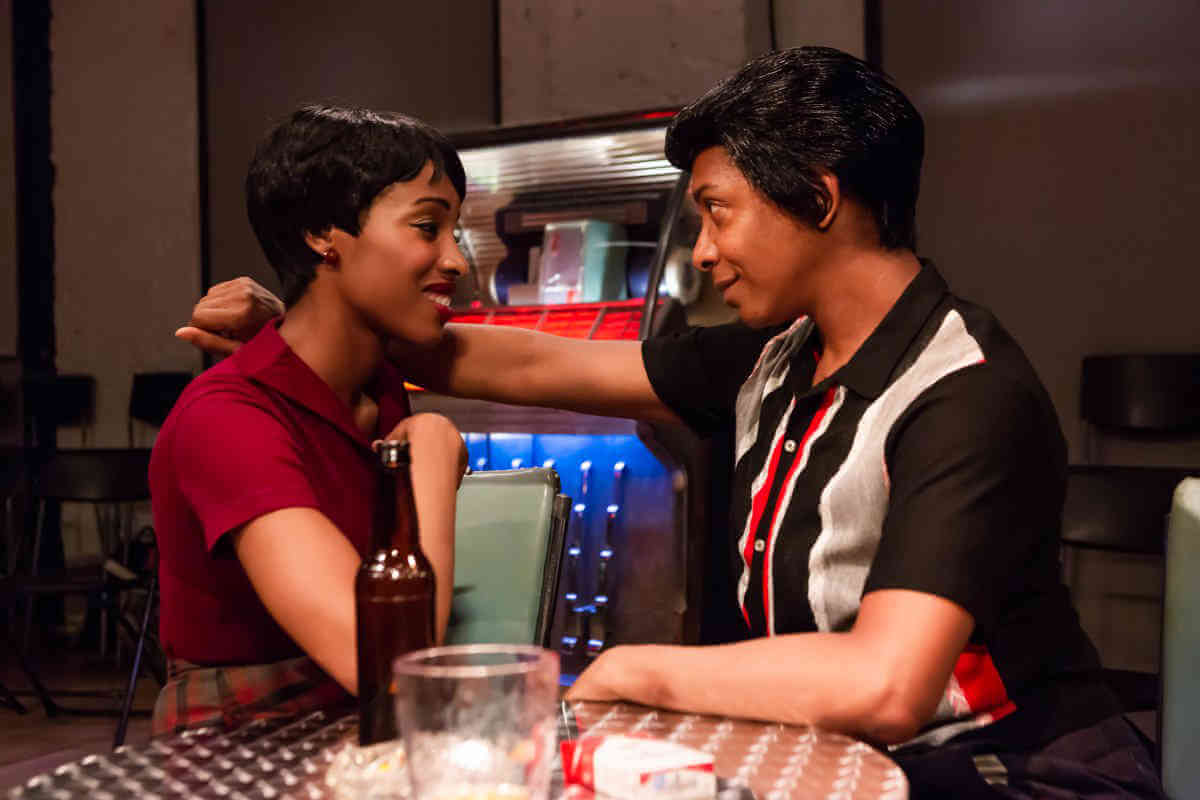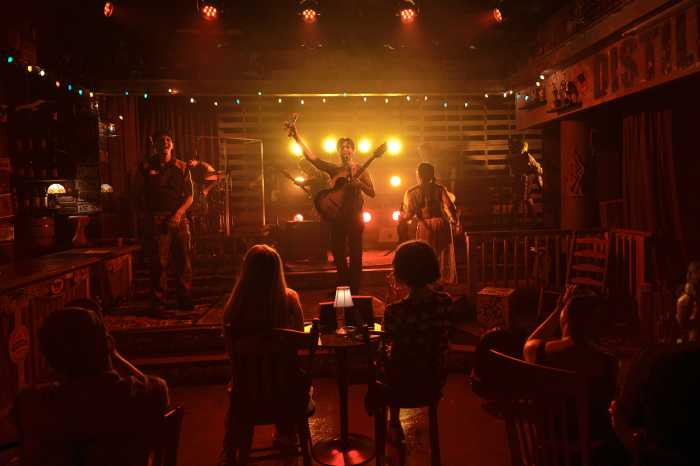It takes a unique person to find the bright side in having your house and all its contents burn down. But when her 6,000-square-foot backwoods-Tennessee home caught fire in 2016, “The ashes rose,” said writer Merril Mushroom.
For 40 years she’d shared the giant space with the “second gay guy I married” and several adopted children, orphans, plus a revolving cast of visitors in need. But overnight, “Everything turned to gold.”
The tragedy prompted an outpouring of support from a wide network of feminists and friends, offering not only money and supplies but also copies of incinerated writings from Mushroom’s lost archive. One such work, “Bar Dykes” — expanded from an essay on 1950s butch courtship rituals — was given new life by art press Pegacorn.
Undervalued and overlooked like so much female art, “Bar Dykes” hadn’t seen the light of day since Mushroom wrote it in the early ’80s, even as iconic male works like “Boys in the Band” continued to be offered repeated seats at the mainstream table. Decades after producing “Dykes” in Los Angeles, playwright Robert Patrick sent the new art book to Kathleen Warnock of TOSOS, the queer theater company founded by Stonewall veteran Doric Wilson.
Warnock found the play (and its author) so compelling she became obsessed with seeing it staged.
“Merril’s a national treasure,” Warnock said, noting Mushroom’s idea of retirement is continually organizing for the communities around her. “She makes people’s lives better.” Three years after discovering the long-lost work, Warnock’s obsession has borne fruit: Audiences can relive a time gone by not from a distance but seated among the 11 actors embodying a historic slice of lesbian life in an immersive production at the Flea Theater.
It’s a bold move in our gender-fluid age to drop us into a world where women hew to rigid sex roles. Now in her late 70s, Mushroom admits to being surprised by the attention.
“There’s so little identification as lesbians by the younger women,” she said, adding that modern identity politics confuses her. “I came up in a binary society; that’s where the butch/ femme stuff all comes from. It’s yin or yang; you have to be one thing or another. But now the kids are like a little bit of everything, or nothing.”
In her day, lesbians and gay men often married each other: for safety, cover, child-rearing, even citizenship. Mushroom did it twice, fleeing Miami Beach and moving with her first gay husband to New York.
“I always wanted to live in the Village and be a starving writer,” she said.
New York in the ’60s amazed her.
“The first time I went to a gay bar in New York, it was raided by the police — except instead of throwing everyone into paddy wagons and taking them downtown, nobody got arrested!,” she recalled. “I was astonished.”
She’d make the city her home for more than a decade.
A butch mainstay in bars named things like Sea Colony and Cookie’s, she drifted from that scene after a Village Voice ad for a play lured her to Caffe Cino, birthplace of Off-Off Broadway and très gay acting-out. (The title was “Only a Contessa May Dance When She is Crazy but Not Demented.”) She met Bob Patrick, who was waiting tables there, and became a regular, producing and writing theater, bringing leftovers from her public school lunch lady shifts to feed starving artists like Patrick and neighbor Lanford Wilson.
Ms. magazine published her first mainstream piece in the early ’70s, about making wine from flowers. A prolific period followed. To score free copies of publications she hungered to read, she wrote lesbian-themed stories; donning her professional hat, she tackled Special Ed, ahead of her time on environmental and other causes of ADHD and autism in children. Discovering a friend had made a fortune writing for trashy magazines, she followed suit, bringing readers of Modern Romance and True Confessions tips on feminist enlightenment and community outreach. In her spare time, she sold handmade crafts from an East Village store that provided free food and clothes to needy street kids.
But New York was starting to feel “used-up,” and after “a great big huge acid trip” with some fellow psychedelic advocates she traded city life for sustainable back-to-the-land country living. In the unusually queer-friendly Dowelltown, Tennessee, she became an active proponent of its nonconformist traditions.
“I live not too far from a Faeries sanctuary that’s been going on for about 45 years,” Mushroom said. “There are several other fairly large collectives, a lot of young kids in their 20s, a lot of trans folk or gender-nonspecific.”
The house she’d built with gay guy #2 had minimal plumbing and heat, requiring rough sacrifices.
“It was great when we were 35,” said Mushroom; not so great after 70. As luck would have it, she’d bought a space nearby, seeking privacy from the ménage who’d always filled her house — and closed on it two days before the fire.
“I was going to clean out all my stuff, because I didn’t want my kids to be left with everything,” she said, “but it got cleaned out for me.”
Finally living on her own has brought other changes: “I have a flush toilet for the first time in 40 years! And air conditioning and heat that work by pushing a button on the wall.”
Too “tired” and rooted in her community to join “Dykes” at the Flea, she hopes audiences will enjoy the experience. Warnock says today’s viewers will be surprised.
“Young gays have grown up with some form of civil rights, and a lot of them didn’t know there were things like people getting arrested and having to wear three items of sex-appropriate clothing,” she explained.
A twist that drives the piece will shock them, Warnock said, and the “window into 50 years ago” — revived in period settings and costumes by Ben Philipp, from “The Marvelous Mrs. Maisel” — will resonate.
“They’ll recognize the people in that time and place who have the same needs we all have, humanly,” Warnock added. “They want to be with someone, they want to have fun, they want to love, they want to laugh. It was a very difficult thing for gay people to do in that time. These are all women mostly in their 20s — young people who just want to live.”
Much has changed since then — and too much hasn’t.
“I hope they maybe get into some discussion among each other,” said Mushroom of the new generation to discover her play and the world it conjures. “But mostly, I just hope everybody has a good time.”
BAR DYKES | Flea Theater, 20 Thomas St., btwn. Broadway & Church St. | Through Aug. 3: Wed.-Sat. at 7 p.m. | $30 at theflea.org | Seventy-five mins.



































